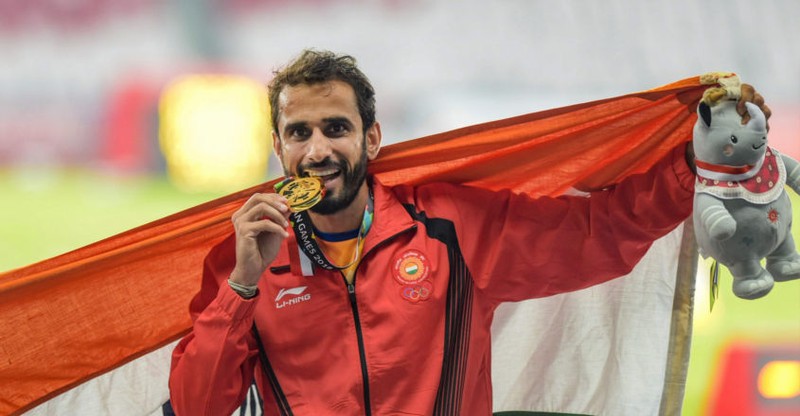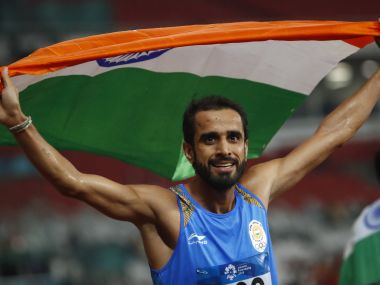It is very luring to speak of the newest unlikely hero’s emergence as a typically Indian story. Not a few would look at Manjit Singh’s defeat of national record holder Jinson Johnson in the men’s 800m final in the Asian Games at the GBK Athletics Stadium in Jakarta on Tuesday and be tempted to speak of him as the jobless son of a farmer who expressed himself joyously on track.

Yet, we must resist the temptation of taking that route, at least for a moment. For two reasons. First, it is fascinating that he was wrapped in cotton-wool, away from public eye, until recently. Second, he has been in national camps for a good part of two years and his training needs have been taken care of by the Athletics Federation of India (AFI) and the Sports Authority of India (SAI).
Manjit Singh won gold medal in men's 800m event at 2018 Asian Games in Jakarta. APManjit Singh won gold medal in men's 800m event at 2018 Asian Games in Jakarta. AP
Manjit Singh was the first choice 800m runner as early as in 2010. But after a semi-final appearance in the Commonwealth Games in Delhi, he slipped away from collective consciousness. He spent two years on contract with one of India’s sports-loving Public Sector Undertaking and when it seemed as if he was making no headway as an athlete, his contract was not renewed.
India seemed to be in a desperate quest for half-milers to emulate the legendary Sriram Singh (gold in Tehran Asian Games, 1974) and Charles Borromeo (gold in 1982 New Delhi Asiad) to win the blue riband event. It fielded Sajeesh Joseph alongside Francis Sagayaraj in 2010. Four years later, Joseph was India’s sole representative in the event.
The revolving door saw many come and go but none, barring Jinson Johnson promised to do well at the Asian Games, an event in which India had a fairly good record with medals in 1951 and 1954 and in every edition between 1962 and 1982. And then, almost without notice, India’s 800m talent cupboard was dry as a bone. And it was the women who took over the baton.
Manjit Singh’s run in the Inter-State Championship in Hyderabad (1:48.61) made a few within the corridors of AFI sit up and take note. The Haryana athlete was representing Punjab, but this was a different runner to the man who had run 1:53 the previous year. And, AFI officials realised that it would pay to invest in Manjit Singh as a second runner after Jinson Johnson.
The 29-year-old’s evolution from a 1:53 runner in 2015 to a 1:48.04 runners in a couple of years and a remarkable 1:46.16 half-miler is nothing less than a fairytale to those who follow this amazing distance that combines speed, strength and stamina like few other events and is seen as one of the holy grails of track events.
“We worked very hard over the past two years and treated it as a mission to get gold for India in Jakarta,” Manjit's coach in the Indian camp, Amrish Kumar, said. “I cannot recall him taking a day’s break to go home. The spirit of sacrifice and the determination to clip his personal best by working hard and uncomplainingly has helped him deliver this result.”
The high-altitude training camp in Bhutan helped ahead of the Asian Games. Kumar was not convinced that his ward should train there but allowed himself to be persuaded by the planning committee of the AFI. “I must admit that training in altitude had helped and that the Indians raced smartly and well to take gold and silver,” he said.
Manjit Singh’s target was gold, even if it came ahead of the more celebrated Jinson Johnson. The target was not the national record time. They had worked together to get that record for the armyman, Manjit setting the pace over 500m for Jinson Johnson to go flat out over the rest of the distance and break a long-standing mark, set by Sriram Singh in the 1976 Montreal Games.
On Tuesday night, there was no room for such understanding. It was each man to himself, so long as they were battling for gold. And while Jinson Johnson spent much energy in running past Abraham Rotich (Bahrain) and Abdulla Abubaker (Qatar), he had not seen Manjit Singh gain ground on the outside lane.
In fact, Manjit Singh showcased a kick over the final 90m to run through to gold ahead of his teammate and the Qatari, whose front-running along with Rotich seemed to leave the Indians and Iran’s Amir Moradi in their wake. It was part of the plan, coach Kumar was to reveal after the race. And he was pleased that it worked like magic.

“I had told him to not follow his instinct for front-running but to conserve energy by keeping abreast of the leaders till the 500m mark and then delivering a final burst to the break beam,” he said. For a while, it seemed that he would not get the room to slip past the leaders, boxed in by them, but turning on the home straight, he found an opening and drove through.
With three runners in blue vests finishing among the top four, it seemed as if the two Indians had been pipped at the post by the Iranian. It was not until the giant screen flashed the result that most realised that an unlikely hero, whose destiny has been carefully crafted away from limelight, had emerged, opening a few doors for himself with the 800m gold medal.
Yes, the unemployed son of a farmer, sacrificing his holidays to train with one goal in mind, would find a few willing to place him and reward him, flicking some gold dust in the process. That then, could well be the typically romantic, emotional Indian story that we so love to hear. Meanwhile, the plotters of his destiny will venture into newer territories.
Comments